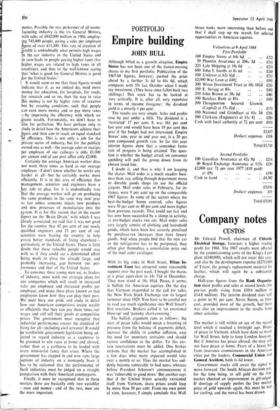Empire buildink .
PORTFOLIO
JOHN BULL
Although billed as a-growth sitnaticin, Empire Stores has not been one of the fastest-moving shares in my first portfolio. Publication of the 1967-68 figures, however, pushed the price ahead by a further 3s 6d to 66s 6d, which compares with 55s last October when I made my investment. (They have since fallen back two shillings.) This stock has to be" looked at very critically. It is, after all, very expensive in terms of income foregone: the dividend yield is a miserly 1 per cent.
The results are very simple. Sales and profits rose by just under a fifth. The dividend is a 'restricted' 17 per cent. It was 161- per cent last year and would have been 19 per cent this year if the budget had not intervened. Empire
Stores' aim, year in and year out, a 20 per cent compound growth fate. So far this year interim figures show that a somewhat faster rate of progress is being attained. The ques- tion is whether the budget attack on consumer spending will pull the group down from its chosen trend line.
I doubt it, and that is why I am keeping the shares. Mail order is a much steadier busi- ness than, say, selling through department stores or durable goods shops (to use the official jargon). Mail order sales in February, for in- stance, were 9 per cent up on the comparable 1967 figures. In some of the sectors where the beat-the-budget boom centred, sales figures were 30 per cent or 40 per cent and more higher than previous records. That could not last and has now been succeeded by a slump in activity, as pre-budget stocks run out. Mail order sales very largely consist of clothing and household goods, which have been less severely penalised by purchase-tax increases than have luxury goods. And when people find that the new car or the refrigerator has to be postponed, they often give themselves a consolation prize out of the mail order catalogue.
With its big stake in Wall Street, Witan in- vestment Trust has attracted some reasonable support over the past week. I bought the shares at a price equivalent to 14s 7fd in December. They now stand at 18s 10fd. Peace, it seems, is bullish for American equities. On the day that Vietnam responded to the call for talks, the New York Stock Exchange saw its largest turnover since 1929. You have to be careful not to read too much significance into Wall Street's first reactions. Brokers called it 'an emotional blow-up' and 'panicky short-covering.'
The bullish argument runs as follows: the start of peace talks would mean a lessening of pressure from the balance of payments deficit, increase the ability to combat inflation, ease the need for monetary restraints and should restore confidence in the dollar. To this cer- tain reservations must be added. One broker reckons that the market has accomplished in a few days what many expected would take over a month or so. Thus the market has sud- denly become vulnerable to bad news, whereas before President Johnson's announcement it was 'vulnerable to good news.' But another says that if the United States actually extricated itself from Vietnam, share prices could leap by more than 50 per cent. From my own point of view, however, I simply conclude that Wall Street looks more interesting than before and that I shall step up my search for selected opportunities in American equities.
Valuations at 9 April 1968 First Portfolios-.
100 Empire Stores at 64s 6d ..
50 Phoenix Assurance at 206s 3d 225 Lyle Shipping at 19s 6d • .. 600 John I. Jacobs at 8s xd 100 Unilever at 62s 4fd £2,000 War Loan at £491 300 Witan Investment Trust at 18s 1014 100 E. Scragg at 81s ..
250 John Brown at 38s 6d 100 Barclays Bank at 81s 200 Throgmorton Secured Growth (Capital) at 17s 4fd 100 National and Grindlays at 61s 3d 500 Clarkson (Engineers) at 1 ls 44 .. Cash with local authority at 71 per cent £5,857
DeduCt: expenses 1108
Total £5,749
- Second Portfolio
100 Guardian Assurance at 42s 9d .. £214 40 Royal Exchange Assurance at 115s £230 £2,000 Gt.c 71 per cent 1977 (£10 paid) at £94 £190 Cash in hand £5,016
Deduct: expenses £15
Total £5,001 -.• £322 £516 £219 £240 £312 £995 £283 £405 £4$1 £405 £174 £306 £284 £915 £4,382










































 Previous page
Previous page